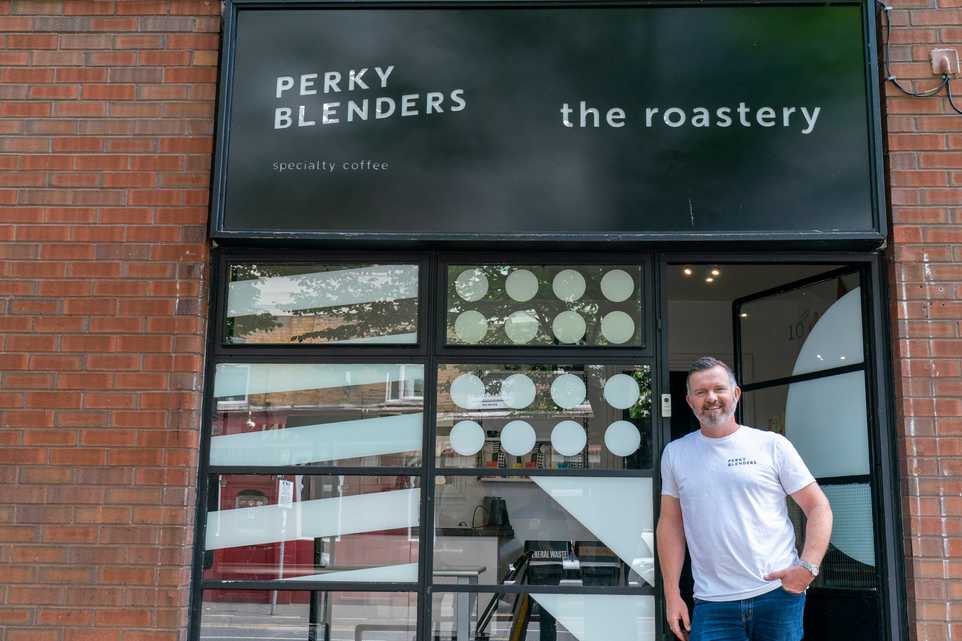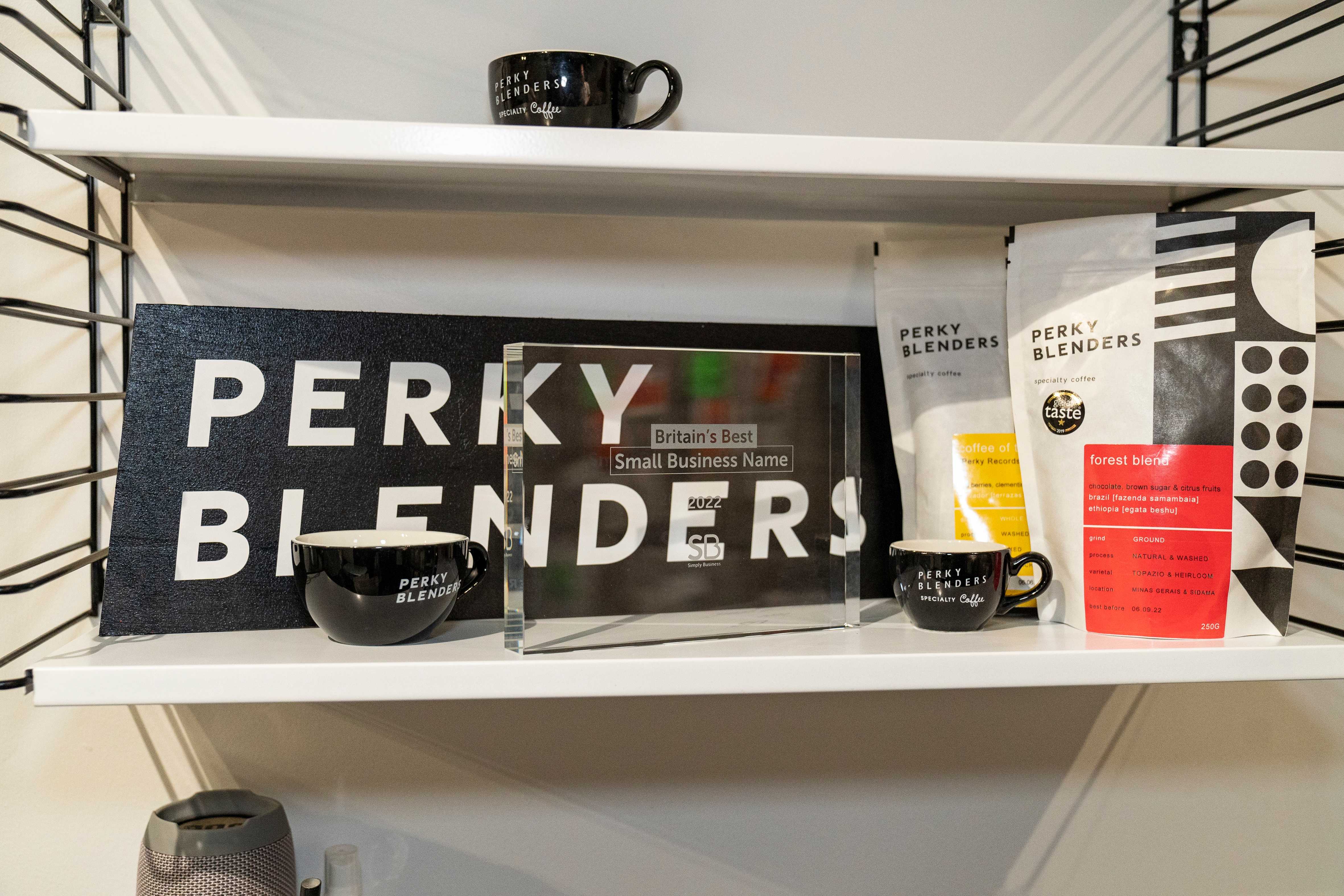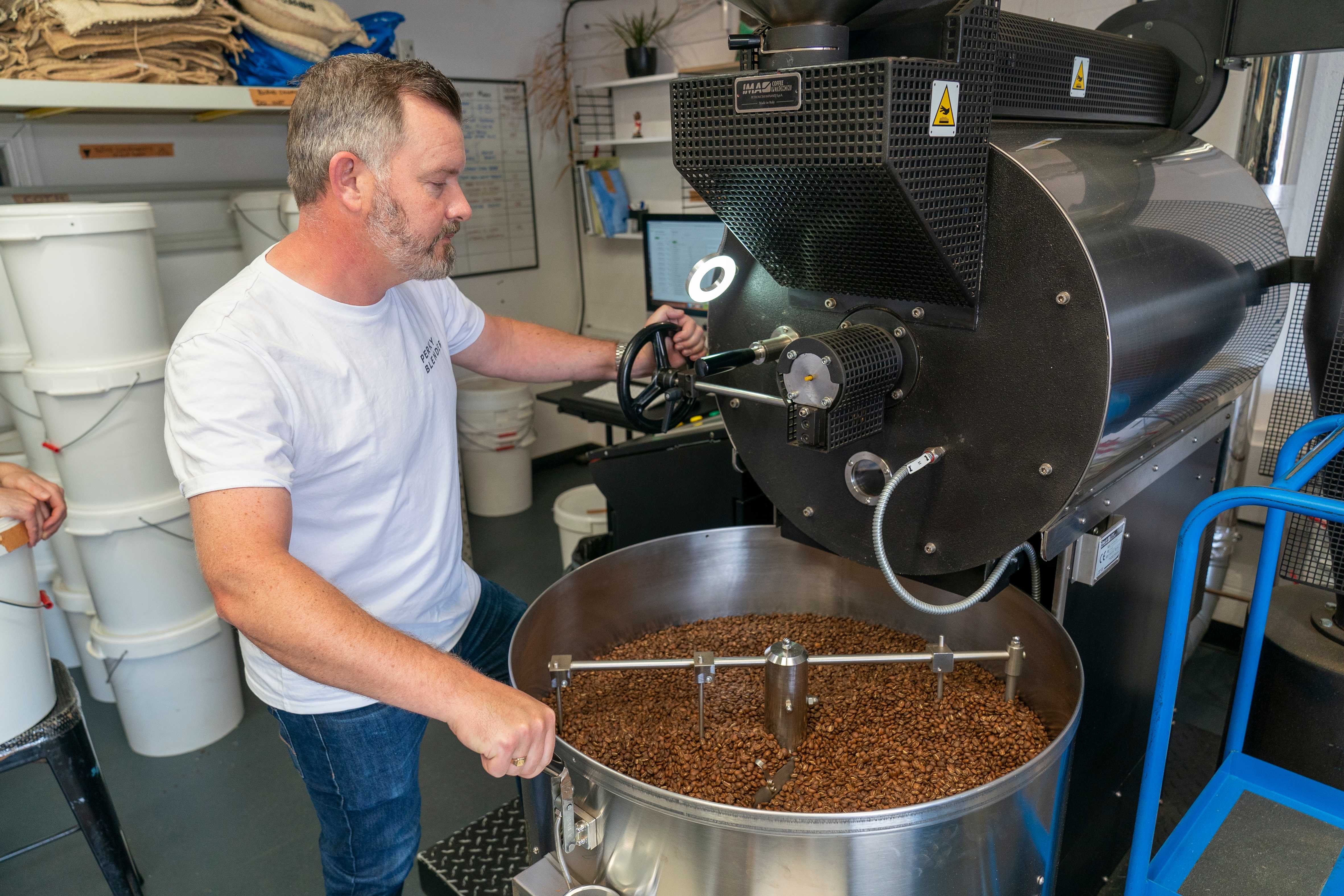Revealed – the UK's best small business name
5-minute read

After almost 1,500 entries, and 4,500 votes, the winner of the Simply Business award for ‘Britain’s Best Small Business Name’ has been crowned.
‘Perky Blenders’, a specialty coffee roastery in East London, beat off stiff competition from Suffolk tiler ‘Grout of This World’ and an Edinburgh-based personal shopping business called ‘Satisfashion’.
Following their award win, we caught up with Perky Blenders’ managing director and co-founder, Adam Cozens. Find out more about how they built their memorable brand, plus how they remain sustainable while battling rising costs.
What’s in a name? The rise of Perky Blenders
Founded in 2015, Perky Blenders started as a cart outside a train station and now operates three shops in Waltham Forest, supplies over 60 businesses, and has an award-winning coffee subscription service.
Central to its success has been its memorable and engaging brand. This comes as no surprise as a third of people told us they’re more likely to shop at small businesses with witty names.
But where did the Perky Blenders name come from and how has it helped the business to grow so rapidly?
The name is based on the BBC TV show Peaky Blinders, the final series of which aired recently.
“Part of a successful business is that you’ve got to have something that’s catchy, engaging, and memorable and it’s all of those things,” says Adam.
“We very nearly didn’t stick with the brand itself as we thought it was a little on the cheesy side. But it’s just at that right level of engagement and it’s entirely relevant to the business.
“From the outset, we wanted to associate ourselves with all the other cool businesses in Waltham Forest. You can't call yourself cool because that’s not cool – the brand itself has to do that,” he explains.
“Perky Blenders is something people get and want to be involved with. It’s not a brand that's our own ego, it’s something for everyone, for the community.”

The key steps to building a successful community business
Adam explains that the Perky Blenders business has grown in stages, with an effort to always remain ‘impactful, engaging, and real’.
“We started with a high, branded gazebo above the cart to make sure people could see us. We went to street markets and events where we stood out above plain, cheaper non-branded food offerings.
“Although we had a cart, we were already building our subscription model. We were roasting, making flavours by blending great quality coffee from all areas of the world, and immediately selling that coffee,” he says.
So, how did they get to the next stage?
“Through building our subscription model. By 2016, we’d grown to 1,000 subscribers by pushing the cart to the right places – highly populated areas with a demographic that fitted exactly what we were trying to do with our brand,” Adam explains.
He says they also focused on selling wholesale into gastro outlets and their favourite local restaurants who appreciated the great product and catchy brand.
After that it was bricks and mortar with Perky Blenders’ first shop in Leytonstone Station.

A key part of the company’s brand is its commitment to trading sustainably and it’s something that most independent businesses already take very seriously, according to Adam.
“We represent a sector of the coffee market where people trust where it’s being sourced from, the quality of the beans we’re buying, and the attention to detail in the way we’re producing it.
“Specialty coffee roasters produce a way better product, there are much larger companies in the coffee sector that are trying to catch up now.”
Adam says that the business has grown through a combination of ‘shops, community, and love for our product’.
“It’s about engaging people online and being able to tap into the community in Waltham Forest.”
Are community-minded businesses saving the UK’s high streets?
Britain’s high streets have been struggling for several years and in many places these problems were made worse by the Covid-19 pandemic.
However, Adam believes that community businesses can help them to recover.
“One of the reasons the high street has really suffered is simply down to the fact that they all look the same – we’ve had large corporations offering the same retail and the same food and drink, with no diversification,” he explains.
“Independent businesses can offer that, they’ve got a really key role in making things interesting.
“Because of the last two years, there’s a lot more people working from home and that means a lot more people around these towns which creates an opportunity for high streets to be rejuvenated.”
He adds that more people now see running an independent business as ‘feasible’ and ‘reachable’, but that the way commercial premises are leased needs to be changed.
Rising costs – is the worst yet to come?
Rising energy, fuel, and stock costs, combined with expensive leases as businesses fight to be in the best locations, are putting pressure on many small businesses.
In fact, our research found that 70 per cent of businesses see rising costs as their biggest challenge in 2022. According to Adam, the worst of the pain could still be yet to come.
“I see a lot of businesses trying to take on leases that are way too expensive, just because they think they’re in the right location. You’ve really got to think about stuff like that – it’s not just about negotiating, it’s about finding the right space at the right time,” he says.
He explains that small businesses may be considering increasing prices to combat rising costs and it’s something that’s worked for Perky Blenders.
“We put our prices up just before Christmas, simply because we hadn’t done that since inception. It scares you a bit more as an independent as you consider the likely impacts, because you can’t really reverse out of it.
“Our customers were understanding, we had very little feedback. I think people have come to expect it. We had to look after our subscribers and give them some benefits and then in the shops we put prices up by only 10%.”
Adam’s advice for small businesses considering increasing prices is to ‘not be afraid’ but to ‘do it at the right time’.
“I think consumers understand - we’re all starting to make choices that we might buy a little bit less, but at least we’re still there.”
Need inspiration for a catchy business name?
As we can see from the success of Perky Blenders, having a memorable business name can help a brand to establish itself in a competitive market.
Here at Simply Business, we know all about the power of having a good business name.
Our latest TV advert, You Name It. We Insure It, shines a light on the wit and creativity of small business names across the UK. Watch it below and read more about our campaign.
Read more about the latest digital marketing trends.
Interested in entering business awards? Read our guide to writing a business award entry.
If you need help developing your brand, read our guides on creating a brand identity and tone of voice.
Meanwhile, our Business Name Generator can give you the light-hearted inspiration you need to get started.
Has your business name helped you to build your brand? Let us know in the comments below.
Small business guides
Ready to set up your cover?
As one of the UK's biggest business insurance providers, we specialise in public liability insurance and protect more trades than anybody else. Why not take a look now and build a quick, tailored quote?
Start your quote
Written by
Conor Shilling
Conor Shilling is a Copywriter at Simply Business with over two years’ experience in the insurance industry. A trained journalist, Conor has worked as a professional writer for 10 years. His previous experience includes writing for several leading online property trade publications. Conor specialises in the buy-to-let market, landlords, and small business finance.
We create this content for general information purposes and it should not be taken as advice. Always take professional advice. Read our full disclaimer
Keep up to date with Simply Business. Subscribe to our monthly newsletter and follow us on social media.
Subscribe to our newsletterInsurance
Public liability insuranceBusiness insuranceProfessional indemnity insuranceEmployers’ liability insuranceLandlord insuranceTradesman insuranceSelf-employed insuranceRestaurant insuranceVan insuranceInsurersAbout
About usOur teamAwardsPress releasesPartners & affiliatesOur charitable workModern Slavery ActSection 172 statementSocial mediaSite mapAddress
6th Floor99 Gresham StreetLondonEC2V 7NG
Northampton 900900 Pavilion DriveNorthamptonNN4 7RG
© Copyright 2024 Simply Business. All Rights Reserved. Simply Business is a trading name of Xbridge Limited which is authorised and regulated by the Financial Conduct Authority (Financial Services Registration No: 313348). Xbridge Limited (No: 3967717) has its registered office at 6th Floor, 99 Gresham Street, London, EC2V 7NG.